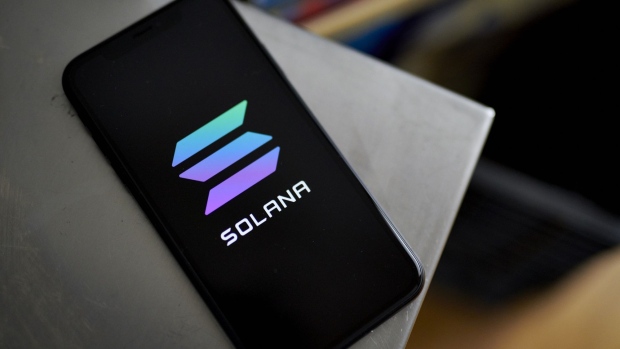Feb 1, 2022
Solana Adds Payment Feature Amid Crypto Network Congestion Woes
, Bloomberg News

(Bloomberg) -- Solana, the popular blockchain that has recently been plagued by congestion problems, said it’s adding a payment service that will allow direct use of dollar-backed cryptocurrencies.
Solana Pay aims to let brick-and-mortar and online merchants and their customers settle transactions with a variety of Solana-based tokens, such as the USDC stablecoin. The service -- which is billed as being decentralized and not owned by anybody -- plans to offer instant settlement, fraud protection for merchants and near-zero cost. It will be integrated with Checkout.com and is used by Bandago Van Rental, a rental-car company.
Solana has become a popular blockchain alternative to older network Ethereum and is mainly deployed for token trading, which has led to significant congestion problems. Overrun with transactions, Solana was down for 17 hours in September. Other slowdowns followed, with one in recent days resulting in some users having trouble liquidating their positions as coin prices plummeted.
“We are in it for the next many years and decades,” Sheraz Shere, head of payments at Solana Labs which incubated the Pay capability, said in an interview. “While there are network congestion issues, we are looking at this as a much longer-term opportunity.”
A long-time Google employee, Shere was previously head of partnerships at Google Wallet, a project he co-founded that lets people pay online, in apps and via mobiles in stores. He was also vice president of business development at American Express Co.
Amid the recent drop in coin prices, trading bots have recently clogged up the Solana network with more than 2 million transactions related to liquidations a second.
Solana has been rolling out software updates to address the congestion problems, and more fixes will be implemented in the next four to five weeks, according to a Jan. 26 Tweets from Anatoly Yakovenko, co-founder of Solana Labs.
Crypto payments transactions would add to the network load -- particularly if they prove popular. Solana Pay is supposed to be simple enough to use, not even requiring downloading an app. It’s integrated with several popular wallets, like FTX and Phantom. A user gets a QR code, which the merchant scans with something as simple as an iPad, and that sends a payment from one account to another.
Crypto payments haven’t taken off in a big way so far. Founded in 2011, centralized competitor BitPay Inc. processes about 65,600 transactions per month -- a drop in the bucket compared with traditional payment companies such as Visa Inc. Most cryptocurrencies have been too volatile to make their use for purchasing goods or services practical. Famously, years ago a programmer spent Bitcoin on two pizzas, in a transaction that’s now valued in billions due to the world’s biggest cryptocurrency’s massive appreciation.
Still, Solana is betting that consumers will specifically use stablecoins -- whose value doesn’t change much -- for payments. Small businesses in particular may welcome the opportunity to spend less money on fees they pay to the likes of Visa, Shere said. In a recent note, Bank of America said Solana “could become the Visa of the digital asset ecosystem.”
“We think the market is there and ready,” Shere said. “We believe Web3 will open a new set of opportunities for commerce.” Web3 are apps using blockchains that some say will reinvent the internet. He foresees the network’s use in loyalty and offers: Say, you buy a pair of sneakers and also get an NFT.
“Our goal is to create a new set of payment rails,” Shere said. “We think these network congestion issues are short term issues.”
©2022 Bloomberg L.P.





